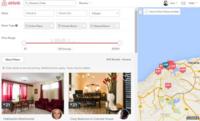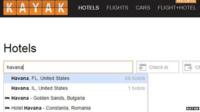
Home holiday rental site Airbnb has added Cuba to its list of destinations.
More than 1,000 properties in the Caribbean nation are already listed, but can only be booked by users in the US.
The San Francisco-based site is restricted from showing the listings elsewhere because of a US trade embargo against the island.
Nevertheless, Airbnb said Cuba could eventually become one of its biggest markets in Latin America.
"We are actually plugging into an existing culture of micro-enterprise in Cuba," said the firm's regional director Kay Kuehne.
"The hosts in Cuba have been [renting out rooms to travellers] for decades."
One expert, however, said the site faced major challenges.

"While Airbnb is a valuable alternative for millions of travellers, in the context of Cuba, because of the high margins it takes from every transaction, it won't necessarily meet with great success," said travel writer Simon Calder.
"All the Cuban bed-and-breakfast providers I know would like to keep all the money rather than handing 15% or more to an American corporation," he added, referring to the total amount the firm deducts from both the host and the guest.
"The other thing is that anybody who has used the internet in Cuba will know that a prospective host is unlikely to be able to respond immediately given the shockingly slow internet there, which reminds me of what you used to find across the developing world in the early 1990s."
The initial listings range from £10 a night for a private room in Trinidad to £695 a night for the whole of a five-bedroom "chalet" in Havana.

Airbnb visitors outside the US can view the listings, but can only add them to their wish lists, rather than book them. An on-screen alert states that the site is not licensed to provide booking services to others.
The US recently began allowing Americans to travel to the island if they obtained a special licence, which can be granted for activities including family visits, educational activities and public performances.
The White House said it would like tourism to be added to the list, and President Obama has urged Congress to begin work to drop the wider sanctions.
"We are ending a policy that was long past its expiration date," he said in his State of the Union address in January.
The move made it possible for online film-streaming site Netflix to be launched in Cuba the following month, which freedom of speech campaign group Freedom House said was more "symbolic" than anything else in the short-term because of the country's "exceptionally slow connectivity".

Visitors across the globe can still find listings for Cuba-based rooms via other US services, including TripAdvisor, which allows users to contact hosts directly but does not take a cut of the bookings itself.
Simon Calder however, criticised the "absurdity" of the fact that several other US-based travel sites, including Kayak and Booking.com, continued to ignore the island's existence.
"Anybody trying to find a flight to Havana on a US airline website will be assured that the city does not exist," he said.






















